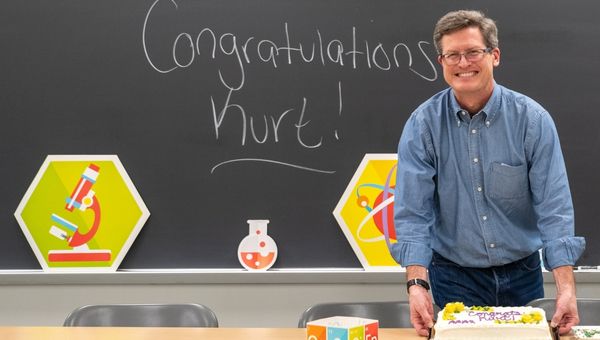Chemistry’s Kurt Kolasinski Named a Fellow of the American Association for the Advancement of Science
 Kurt Kolasinski, WCU professor of chemistry, has been named a Fellow of the American
Association for the Advancement of Science (AAAS), the world’s largest general scientific
society and publisher of the Science family of journals. This honor recognizes his lifetime work, specifically “his outstanding
contributions to surface science and his efforts to educate others about this field.”
Kurt Kolasinski, WCU professor of chemistry, has been named a Fellow of the American
Association for the Advancement of Science (AAAS), the world’s largest general scientific
society and publisher of the Science family of journals. This honor recognizes his lifetime work, specifically “his outstanding
contributions to surface science and his efforts to educate others about this field.”
“AAAS is proud to elevate these standout individuals and recognize the many ways in which they’ve advanced scientific excellence, tackled complex societal challenges, and pushed boundaries that will reap benefits for years to come,” said Sudip S. Parikh, AAAS chief executive officer and executive publisher of the Science journals. The honor of electing esteemed innovators as Fellows of AAAS began in 1874.
Fellows are singled out further because of meritorious contribution to the advancement of science, upholding standards of professional ethics, and scientific integrity.
A full professor, Kolasinski joined the chemistry department in 2006. He says one of the many rewards of teaching is “seeing my students open their horizons and engage in class and lab. I enjoy showing students they’re better than they thought they were.”
In that regard, he not only teaches but also chairs the users group of the University’s Center for Microanalysis and Imaging, Research, and Training (CMIRT), where both undergraduate and graduate students conduct independent research under the tutelage of WCU faculty from his department as well as the Biology, Earth Sciences, Physics, and Anthropology & Sociology departments. Kolasinski is a co-author on many student papers published in scientific journals.
“Research is fun and it’s one way to share why I like science,” he says. “I can relate chemistry to what students will do in graduate school or in a research lab.”
Kolasinski has authored more than 100 scholarly publications, including two textbooks: Surface Science: Foundations of Catalysis and Nanoscience and Physical Chemistry: How Chemistry Works. “Chemical education and dissemination of chemical information are priorities in my work,” he says, adding, “If you do not communicate your ideas, you are not doing science. You are only engaging in a hobby,” a quote that introduces his Physical Chemistry textbook.
Kolasinski’s research concentrates on the study of dynamical processes at the surfaces of semiconductors and metals, in particular the study of electrochemical and laser-assisted processes that form nanoscale and larger structures, including:
- Electroless and metal-assisted etching of silicon to form porous silicon
- Laser ablation of Si, Ti, Al, Zn, etc.
- Anodization to form nanotubes and porous oxides
- Photocatalysis and surface photochemistry
He also serves on the Faculty Senate Executive Committee and is an industry consultant for formation and applications of silicon nanostructures.
Kolasinski previously taught at the University of Virginia (2004–2006), Queen Mary, University of London (2001–2004), and University of Birmingham (UK) (1995–2001). He earned his bachelor of science degree in chemistry from the University of Pittsburgh and his doctorate from Stanford University.
He joins other new Fellows from academic institutions, laboratories, observatories, hospitals and medical centers, museums, global corporations, nonprofit organizations, institutes, and government agencies. AAAS will honor this new class in June at the annual Fellows Forum in Washington, D.C.
On Wednesday, April 12, Chemistry Professor Kurt Kolasinski will discuss his research in “Energy Input and Economics of Silicon in Energy Storage and Generation” for the weekly Sustainability Research and Practice Seminars. In person in Sykes Student Union Room 255 A/B or virtually via Zoom https://wcupa.zoom.us/j/98607753162; passcode: 878376
Information: Visit the Office of Sustainability or email sustainability@wcupa.edu.
